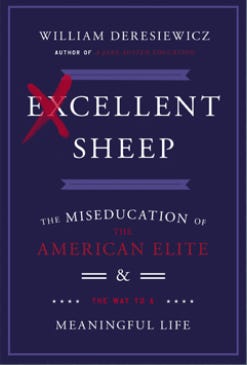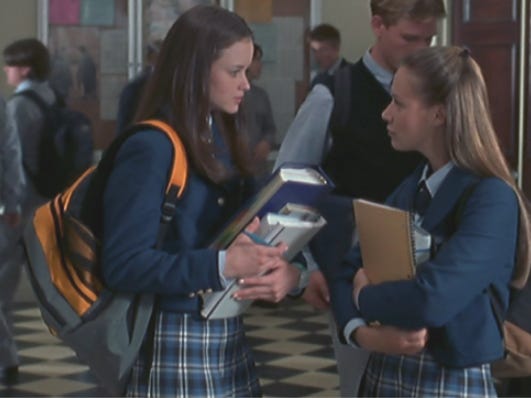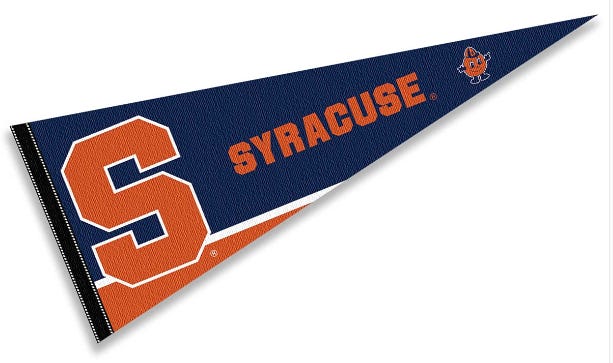Excellent Sheep: Some Thoughts on Post-Secondary Education in the Season of College Acceptances (and Rejections)
I wrote most of this essay more than 10 years ago, after reading William Deresiewicz’s book, Excellent Sheep: The Miseducation of the American Elite and the Way to a Meaningful Life. At the time I hadn’t been freelancing regularly in a number of years and had no idea how to break back into the business. As a result, the essay has been sitting on my hard drive ever since. Then, last week, I read a terrific piece by
, about her reaction to her son’s rejection letter from Dartmouth. I complimented her and told her about my essay, and she encouraged me to run it. I’ve done my best to update it. (Since I wrote it, I’m pretty sure that Gilmore Girls has become even more popular, so maybe there was no reason to provide all the background info I did—other than I had fun writing it and want you all to read it.)When I met my future husband in 1987, he was earning his PhD in molecular biology and biochemistry at Yale. I, who had barely made it out of high school biology, thought he was brilliant. Then he told me that he had lived at home when he went to college, and my opinion plummeted. Who stays home to go to college? Even when he told me that that’s how things were done in his country — Canada — I still thought it was weird.
Now, nearly 32 years after moving to his country, I no longer think it’s weird: in fact, I was delighted that my two kids lived at home when they went to college (or, as it’s called here, university). I was even more delighted that they graduated with no debt and money in the bank, and both landed good jobs in their respective fields.
Having watched my friends and family south of the border shepherd their children through the circus that is Applying to College in the United States, and in some cases remortgaging their homes to cover tuition (even at state schools), I believe Canadians have a more sane outlook on post-secondary education.
I became even more convinced 11 years ago, when my oldest was getting ready to go to college and I read William Deresiewicz’s depressingly compelling treatise, Excellent Sheep: The Miseducation of the American Elite and the Way to a Meaningful Life.
Deresiewicz, who earned his undergraduate and graduate degrees at Columbia University before teaching English at Yale for ten years, argues convincingly that higher education is failing at its once-intended purpose: to teach young people how to think. Instead, he posits, from an early age, schoolchildren in the United States, particularly those raised in wealthy homes, are funnelled into activities designed to gain them admittance to top colleges and universities, the better to funnel them into jobs at top banks, consulting companies, and law firms.
The result is a lot of young people who are incredibly accomplished but don’t know how to make decisions or solve problems, largely because they haven’t had to. They’ve been herded, like sheep, from one activity to the next, with no goal other than to succeed so they can keep succeeding. More damning: they are terrified of failure, seeing it not as an opportunity to learn and improve, but as a sign that life as they know it is over. Many of the students Deresiewicz quotes are miserable, having spent the first two decades of their lives focused on getting ahead instead of discovering what interests them and ignites genuine passion.
I picked up Excellent Sheep in 2013 after reading one of the funniest books I’ve ever come across, Dear Committee Members, by Julie Schumacher. Dear Committee Members is told through letters of recommendation written by Jason Fitger, a disillusioned, narcissistic creative writing professor at a second (or possibly third)-rate Midwestern university. I hadn’t intended to read the two together—I’d put Excellent Sheep on hold at the library at the recommendation of a friend, and it showed up right after I read Schumacher’s book.

In fact, the two are complementary: Dear Committee Members is side-splittingly funny but it’s also a sadly accurate look at the state of humanities departments in North American universities and colleges. It bolsters Deresiewicz’s argument that academic institutions place more value on economics than on the arts and literature. “For those in the sciences and social sciences, sacrifice will come in the form of fewer varieties of paté on the lunch trays,” the disgruntled Fitger writes in a letter to the Vice Provost at his university.
Meanwhile, Fitger notes, in the English department, “More than a third of our faculty now consists of temporary (adjunct) instructors who creep into the building under cover of darkness to teach their graveyard shifts of freshman comp” while “the remaining two-thirds of the faculty, bearing the scars of disenfranchisement and long-term abuse, are busy tending to personal grudges like scraps of carrion on which they gnaw in the gloom of their offices.”
One of the running gags in Dear Committee Members is Fitger’s contempt for the economics department, whose quarters, upstairs from those of the English department, are being remodelled. “Not only do their salaries make ours look like an eleven-year-old’s allowance; they will now be able to offer funding to every student admitted to the econ major,” he writes in a letter to the chair of the English Department (who, as it happens, is a sociologist). “Why don’t you inquire in the dean’s office if—once they close our department down for good—we might be rehired to clean, perhaps with cotton swabs dipped in olive oil, the gold leaf surely to be installed in the brand new fiefdom on the Econ floor?”
I was still marvelling at the way the universe aligned to have me read Excellent Sheep immediately after Dear Committee Members when the alignment was extended. Trolling Netflix, I discovered the TV series “Gilmore Girls.” I knew that it was about a mother and daughter in small-town Connecticut, so I found it surprising and ironic that one of its primary and ongoing sub-plots concerned fictional versions of Dereswieciz’s excellent sheep. For the three or four of you unfamiliar with the show, here’s a recap: Rory Gilmore is 16 when the show begins, the same age that her mother, Lorelai, was, when Lorelai became pregnant with Rory. Rory, who is positively adorable, not to mention grounded, focused, smart and quippy, has no intention of following in her mother’s footsteps, nor does Lorelai want that kind of future for her daughter. Nor does anyone else in idyllic Stars Hollow, the sort of Hollywood-cute town (there’s a gazebo on the town green) whose residents are cheerfully quirky, in a harmless on-the-Spectrum sort of way.
By the end of the pilot episode, Rory has been accepted to Chilton, a snooty private school in nearby Hartford, the better to finesse her lifelong plan of attending Harvard. If I’d realized when I started watching how prominent the getting-into-Harvard theme was, I would have kept track of how many times the university name is mentioned. Given that the show is on Netflix, I could have rewatched and counted, but I had better things to do. However, I did start counting about two-thirds of the way through Episode 16 of Season 3, the show in which Rory receives her coveted Harvard acceptance. My tally: 18 mentions from Minute 36 on.
Rory has a rough go during her first few months at Chilton. It’s never easy to come late to a new school, especially one crawling with entitled rich kids whose parents are Masters of the Universe, duty-bound to turn up their noses at a newcomer whose mother spent her junior year of high school pregnant and is now working her way through community college by managing a country inn.
Rory’s chief nemesis is a wealthy, socially inept, Type A misfit, Paris Geller, who (rightly) sees Rory as a threat to her own plans to waltz into Harvard, her family’s finishing institution of choice. Paris is like a drag version of Sheldon Cooper of the “Big Bang Theory,” minus the naivete that sweetens and softens Sheldon’s obnoxious edges. Everything Paris does is calculated to ensure her admission to Harvard: building houses for Habitat for Humanity, scheming her way to the editorship of the school newspaper, bullying her minions into abandoning their weekend plans to bone up for a debate competition or complete a group project, and traumatizing anyone she fears might steal her spot at the top of the class.
When I was applying to college in the late 1970s, top grades, high SAT scores, editorship of the high school paper, and involvement in the drama club were enough to get you into Harvard or Brown (I know, because that’s where the editors of my public high school paper went. As far as I know, neither of them built houses for the less fortunate before heading off to the Ivies.)
Living in Edmonton, Alberta since the early 1990s, I had no idea how much things had changed. Before Excellent Sheep and “Gilmore Girls,” when my friends back home regaled me with horror stories about the college application process, I commiserated with them, wondered if it truly was that dreadful, and said a silent prayer of gratitude that I live in a country where choosing a university is not a competitive sport.
Although some of my kids’ high school classmates went away for university, most attended one of the post-secondary institutions here in Edmonton, the pervading philosophy being, “Why leave home when you can get a good education in your own back yard?” (If you don’t have a post-secondary school in your backyard, then you go away. Also, my daughter assures me that in some provinces, particularly Ontario, it’s more common to go away to university.)
In-province tuition for the University of Alberta was in the four figures when my kids were students between 2013 and 2020. There were no SAT requirements.
My kids’ application process went like this: they left for school one morning in the fall, attended an application workshop at 10, and were accepted into their first choice programs (kinesiology for her, engineering for him) by 11. All that was required from me was my credit card so they could pay the $75 processing fee. Extra-curricular activities had no bearing on admission; grades did. Both my kids chose activities because those activities were interesting, not because they feared failure to do so would doom them.
Had I discovered “Gilmore Girls” before reading Excellent Sheep, I suspect I would have thought that Paris Geller was a Hollywood caricature, and Rory Gilmore was even more adorable for her blind devotion to Harvard. So single-minded is she in her desire to bleed crimson that she seems utterly unaware that there are other universities in the United States. Viewed through the Deresiewicz lens, it’s more demented than cute. However, it’s hard to hold that against Rory, largely because she’s so likeable. The same can’t be said for Paris, who is irritating and, more often than not, just plain mean.
In true Hollywood fashion, Rory is accepted into Harvard (and also Yale and Princeton, presumably her safety schools) while Paris is rejected, the first Geller in decades to be so shamed. This is a happy Hollywood ending: the bad guy (girl) gets metaphorically spanked, while the underdog succeeds. At some level, it is the sort of ending of which Deresiewicz would approve, though he’d probably have been happier had Rory made her leap to the Ivies from Stars Hollow High instead of a private school.
On the other hand, if you strip away the veneer – the single mother who works in the service industry; the modest, maid-free house furnished with thrift-shop finds; the fact that the only men in the Gilmore girls’ social circle who wear suits and ties are portrayed as objects of ridicule — what you’re left with is someone who has focused her entire life on getting into Harvard. In other words, Rory is no different from Paris, or from the sheep who populate Deresiewicz’s book. That she ultimately chooses to attend Yale (it ranked higher on her pros-and-cons list) is irrelevant: she’s still a sheep, just one who will now bleed Bulldog blue.
Which brings me back to my family, the one I’ve made with my Yale PhD husband. True confession: until my children were in junior high, I harbored dreams that they would go to college in the US. The longer I lived here, the more I realized that my attitude was snobby, elitist, and also kind of stupid: in an ideal world, kids should go to college where they want to go. That mine wanted to stay home was a bonus and not just because it meant there was no room-and-board tacked onto tuition. Having them home for those four years meant I had more time with them. It also meant that if they needed emotional support, which most kids in their late teens and early twenties do, they knew their dad and I were here for them.
I didn’t go too far for college, either—I attended Syracuse University, a mere hour from where I grew up. I had some excellent profs in the journalism school there. Working at the student-run newspaper, The Daily Orange, taught me to be a reporter and gave me lifelong friends.
It’s what I’ve learned in the 42 years since I graduated that I’d like to share with the high school students in the Class of 24 as they begin collecting college acceptances and rejections: in the long run, where you earn your post-secondary degree won’t mean as much as the friends you make, the experiences you have, and the knowledge you gain in the classroom and in daily life as part of a college community. And ultimately, as most of us learn (hopefully sooner rather than later), the academic institution on your resume is not nearly as important as the kind of person you are.








I FINALLY had a moment to properly read this AMAAAAAZING article Debby! Wow. It really just encapsulates everything I vomited-out a couple weeks ago about the agony of "defeat". Thank you for dusting it off and bringing it to light. Beautifully written and SO helpful. btw...Colton chose Northeastern..what used to be considered a "commuter school." Hahaha! xx
Seems as relevant today as ever. And I adore Julie Schumacher's novels. Gut-busting funny. As a recovering academic (left my tenured position in journalism in 2002), I think higher education in the US has failed many.